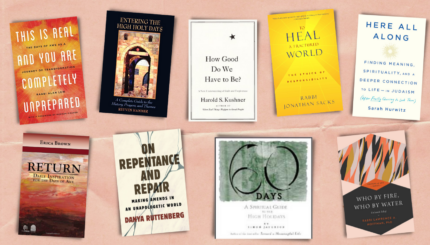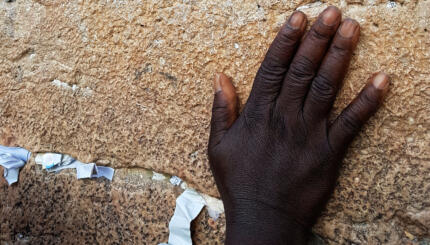Reprinted with permission from JBooks.com.
One of the more arresting images in Dara Horn’s rich first novel is a set of bobbing in New York Harbor. A century later, the book’s protagonist, Leora, spies the same pair of tefillin in a Manhattan antique shop. Horn, whose book is a pastiche of Jewish folklore, Yiddish tales, mystical concepts, and ruthless history, mines and then integrates the symbol-laden images in her narrative. The tefillin that so captivate Leora evoke the words of the Sh’ma–Judaism’s central prayer–that prominently allude to tefillin in the third paragraph. "And you shall bind [these words] as a sign on your hand, and let them be an emblem in the center of your head."
Leora’s fiancée buys the tefillin as a surprise for her. These leather boxes that contain the words of the Sh’ma originally belonged to a new immigrant at the turn of the 20th century. In anticipation of life as a modern man in America, he threw them overboard in front of the Statue of Liberty. The metaphor of the tefillin floating away in New York Harbor only to end up in the hands of a young woman a century later, connects two disparate eras across space and time.
The connection between people and the objects they once possessed is a pivotal theme of In the Image. The book opens with the tragic death of Leora’s best friend, Naomi. Naomi is hit by a car on her way home from high school, and Leora’s initial grief draws her to Naomi’s grandfather, Bill Landsmann. Bill is a living embodiment of Jewish suffering. His family escaped Czarist Russia for Eastern Europe, only to be deported to Nazi concentration camps.

Help us keep Jewish knowledge accessible to millions of people around the world.
Your donation to My Jewish Learning fuels endless journeys of Jewish discovery. With your help, My Jewish Learning can continue to provide nonstop opportunities for learning, connection and growth.
Bill is a quirky man who attempts to bond with Leora by sharing his extensive collection of travel slides. It becomes clear during these extended travelogue sessions that Leora and Bill grieve differently for Naomi. Their grief is a result of how each generation perceives its destiny as Jews.
One of Horn’s preoccupations is the way historical events affect a given generation of Jews. For Bill Landsmann, it was a cruel Diaspora, in which anti-Semitism and ultimately genocide of the Jews defined him. Leora, on the other hand, confronts God as did her biblical forbearers. Just as Abraham’s monotheism is distinguished by his penchant for arguing with God, Leora questions God’s hand in Jewish tragedy. The God of free will is the same God that tolerates evil in the world. Leora’s ba’al teshuva college boyfriend–who comes to embrace Orthodox Judaism during their relationship–further fuels her skepticism towards all things traditionally Jewish.
Leora’s skepticism occasionally veers toward mysticism. Horn deftly shapes that mysticism into a Jewish version of magical realism. When Leora remarks that she feels like a tourist in her own life, she harks back to the Biblical spies who were sent into Canaan. They were overwhelmed by giant men and large insects. Leora is similarly overwhelmed by gigantic themes such as tragedy, romance, history, and faith.
Bill and Leora and their families, those who came before them and will come after them, are inextricably linked. Horn reiterates the point towards the end of the novel by recasting the Book of Job with Landsmann as Job and Leora the New Jerseyite as one of Job’s friends. As Horn’s rendition of the classic Jewish text makes clear, Naomi’s death was one of many tragedies in Bill Landsmann’s life. At a young age, he lost his parents to historical events beyond his control. Later in life, he loses his wife to Alzheimer’s Disease. Ironically, the most significant tragedy is derived from the environment in the form of a "great wave [that] washed up against the wall of his living room, and took with it the boxes containing the seven thousand slides of distant lands." In the end it was God, through an act of nature, who robbed Bill Landsmann of his memories.
Unlike the biblical Job, Bill Landsmann does not recoup his life or his faith. Nor does he have patience for the young Leora, whose simplistic idea of faith is connected to erroneous concepts of "’good’ and ‘bad,’ of ‘right’ and ‘wrong.’" Jewish suffering is not a judgment rendered from the heavens but one that is caused by people here on earth.
Dara Horn’s fresh, vibrant voice shapes and dramatizes 100 years of Jewish American history–a history generated by catastrophes and the free will that caused them. In the Image is the work of a young writer already demonstrating considerable literary power.


